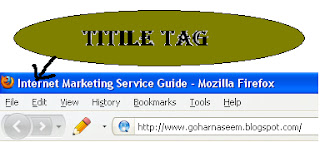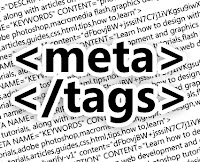What is a Title Tag?
 |
| Title Tag |
The title tag is one of the most important factors to achieve high rankings (positions) to reach in search engines.
The title tag should be found on every HTML page. It's part of the HTML code. Terms, which are detected in the title tag appear in the title bar at the top of each browser and be used as a suggestion, if you want to add an HTML page to your browser favorites.
The HTML code for the title looks like this:
<head>
<TITLE> Enterprise - terms of page </ TITLE>
</ Head>
The title tag is one that is in the <head> each side. Shortly after that usually follow the so-called meta tags such as 'keyword' or 'Description'. The order is not important. If you use an editor like Dream weaver or GoLive, the individual tags are generated in different orders.
Some tools and content management systems generate the title tag in most cases because of the file name when saving. Then in the title bar appear ridiculous terms like 'Home.html "or" Contact.html. "Often it's a beginner in web design that make such mistakes. But professionals in web design often neglect the title tag and do not recognize the potential that the title Tag in search engine rankings offers.
Search Engines and Title Tags
Each search engine uses the title tag to analyze your site and index. The title tag is used to display the results. Terms that you enter in the title tag are displayed as 'Headline', including most of the text will appear in the Meta 'Description' or text fragments from the body area of your document.
It should be clear that a user is more likely to click a search result if the title of the results of the entered word appears instead of "Home.html". The title tag should therefore also animate it clicks.
The title tag is one addition to the visible text in your document and the Link Popularity (external links to your site) is definitely the main factors in search engine performance. Search engines place (yet) high weight on this day, and compare these with the actual content of your website. so they should match the title tag and the content of your website.
Most search engine index to make the content of the title tag and it really one of the major factors in the page ranking process. If you have not optimized title tag, could the train without you ,go so far as rankings are concerned. Plus, it is not the best User experience to visit a website without a title tag as the title tag in Favorites appears, provided when a page as a bookmark is. The most common title tag "Untitled" is not a great Incentive for people to come back to your site.
So how do you write a good title tag? Let's say that you are a Business, have used the nose rings in a suburb of Vienna sold. You have a few options as far as the title tag is affected.
The title tag should be specific to each page of your site and be created. Repeat just your company name appear on every page, because you place a chance, targeted traffic to each page to bring.
An individual page titles per page is very important for search engine optimization.
What belongs in a title tag?
We hear various principles and tips for Title Tag. It should not be too long but not too short. One should not lose valuable space e.g. with the company name. All these tips are correct in the short term. If you want your pages to search engines have long term, you should try any tricks with the title tag.
Here's what not to do:
- Many repeated words
- More than 200 characters long text
- CAPS ONLY use
A good title tag looks like this:
<TITLE> Company - keyword1 keyword2 keyword3 </ TITLE>
If your business 'Hello AG' means and the company sells as Kitchen accessories, could mean the title tag:
<TITLE> Hi AG - kitchen accessories cookware and kitchen appliances </ TITLE>
The title tag should therefore contain as well-defined keywords, which then appear in the text. The more important a word is, the more important is the position of the term in the title tag. Important terms must first be. It seems that the length of the title tags to play a very important role. Most search engines cut the title tag in the search results after 60-80 characters. In the databases, but all signs seem to be saved. A length between 100 and 160 characters seems to be fine with most search engines.
Repetitions are fine too, as long as the words do not follow one after the other. A day in the form
<TITLE> Hi AG - kitchen accessories and cookware - kitchenware for Europe </ TITLE>
appears on the search engines to have any negative effect. On the contrary. Some search engines seem to value such title tags even better than if the term appears only once. But you should avoid mere repetition of words.
Use to separate keywords by commas or dashes. Search engines recognize this as a 'separator' in the title tags. Use normal notation. Once a term with large initials and then again to write in small letters at the top search engines seems to have no influence. Most Search Engines are in fact not 'Case sensitive', ie They do not distinguish between upper-and lowercase letters.
Your text and the Title Tag
A good title tag can be set only if the entire text is written on the topic. And the Title Tag is only optimal effect for search engines if it matches the text. Thus, one should be writing the text of professional SEO copywriters. The title tag should reflect a portion of the existing text, but not word for word. Important to reduce to three or four words per title. And each page should have its own, tailored to the text title tag.
It is best to leave us this fine work. Who makes mistakes or wrong title tags is disappearing, possibly from the index of the search engines - that we can avoid through our expertise. Our search engine optimization service includes an optimum adjustment of the title tag on every website.
Title Tags - Tips
- See for yourself, each title tag for each page of your site to specify. Each page should have its own unique title tag have, which just indicates what the page is really.
- Put your most optimized keyword phrases at the beginning of the title tag, each preceded by the keyword, the more relevant.
- Make your title relevant to what the focus of your page and They avoid selling language, such as "Best Nose rings in the world!".
- Connect one or two relevant keyword phrases one, but avoid a simple succession of key words (Which could be viewed as spamming). Take instead a readable title that will attract visitors even if it results in the a search engine is.
- You go locally. If you are a dog breeder in Munich and want to be found locally, then put in any case, your geographic Position in your title tag.






